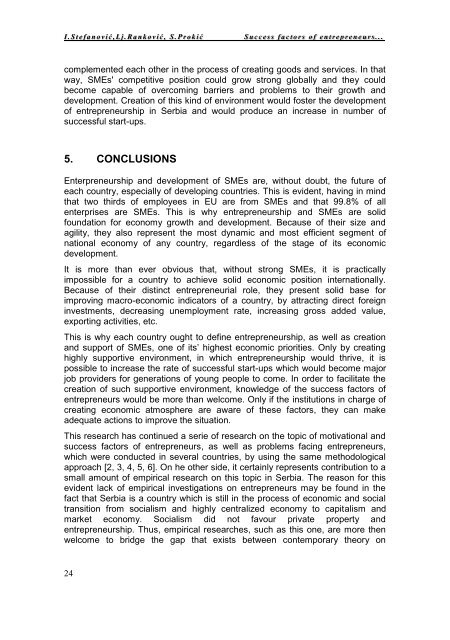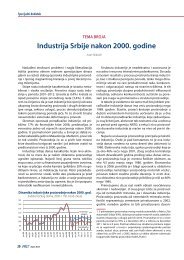- Page 1 and 2: industrija časopis Ekonomskog inst
- Page 3 and 4: UDK - 33 INDUSTRIJA YU ISSN 0350-03
- Page 5 and 6: UDK - 33 INDUSTRIJA YU ISSN 0350-03
- Page 7 and 8: Original Scientific Paper UDK 336.
- Page 9 and 10: I n d u s t r i j a 2 / 2 0 1 1 . M
- Page 11 and 12: I n d u s t r i j a 2 / 2 0 1 1 . p
- Page 13 and 14: I n d u s t r i j a 2 / 2 0 1 1 . m
- Page 15 and 16: I n d u s t r i j a 2 / 2 0 1 1 . F
- Page 17 and 18: I n d u s t r i j a 2 / 2 0 1 1 . A
- Page 19: I n d u s t r i j a 2 / 2 0 1 1 . 2
- Page 22 and 23: I . S t e f a n o v i ć , L j . R
- Page 24 and 25: I . S t e f a n o v i ć , L j . R
- Page 26 and 27: I . S t e f a n o v i ć , L j . R
- Page 28 and 29: I . S t e f a n o v i ć , L j . R
- Page 32 and 33: I . S t e f a n o v i ć , L j . R
- Page 35 and 36: Original Scientific Paper UDK 336.
- Page 37 and 38: I n d u s t r i j a 2 / 2 0 1 1 . N
- Page 39 and 40: I n d u s t r i j a 2 / 2 0 1 1 . c
- Page 41 and 42: I n d u s t r i j a 2 / 2 0 1 1 . T
- Page 43 and 44: I n d u s t r i j a 2 / 2 0 1 1 .
- Page 45 and 46: I n d u s t r i j a 2 / 2 0 1 1 . 5
- Page 47 and 48: I n d u s t r i j a 2 / 2 0 1 1 . k
- Page 49 and 50: I n d u s t r i j a 2 / 2 0 1 1 . (
- Page 51 and 52: I n d u s t r i j a 2 / 2 0 1 1 . F
- Page 53 and 54: I n d u s t r i j a 2 / 2 0 1 1 . i
- Page 55: I n d u s t r i j a 2 / 2 0 1 1 . 9
- Page 58 and 59: V. M i ć i ć , A . Z e r e m s k
- Page 60 and 61: V. M i ć i ć , A . Z e r e m s k
- Page 62 and 63: V. M i ć i ć , A . Z e r e m s k
- Page 64 and 65: V. M i ć i ć , A . Z e r e m s k
- Page 66 and 67: V. M i ć i ć , A . Z e r e m s k
- Page 68 and 69: V. M i ć i ć , A . Z e r e m s k
- Page 70 and 71: V. M i ć i ć , A . Z e r e m s k
- Page 72 and 73: V. M i ć i ć , A . Z e r e m s k
- Page 74 and 75: V. M i ć i ć , A . Z e r e m s k
- Page 76 and 77: P . D . R a d o j e v i ć O d l i
- Page 78 and 79: P . D . R a d o j e v i ć O d l i
- Page 80 and 81:
P . D . R a d o j e v i ć O d l i
- Page 82 and 83:
P . D . R a d o j e v i ć O d l i
- Page 84 and 85:
P . D . R a d o j e v i ć O d l i
- Page 86 and 87:
P . D . R a d o j e v i ć O d l i
- Page 88 and 89:
P . D . R a d o j e v i ć O d l i
- Page 90 and 91:
P . D . R a d o j e v i ć O d l i
- Page 92 and 93:
P . D . R a d o j e v i ć O d l i
- Page 94 and 95:
P . D . R a d o j e v i ć O d l i
- Page 96 and 97:
P . D . R a d o j e v i ć O d l i
- Page 98 and 99:
P . D . R a d o j e v i ć O d l i
- Page 100 and 101:
S . J o v a n o v i ć , D . M a t
- Page 102 and 103:
S . J o v a n o v i ć , D . M a t
- Page 104 and 105:
S . J o v a n o v i ć , D . M a t
- Page 106 and 107:
S . J o v a n o v i ć , D . M a t
- Page 108 and 109:
S . J o v a n o v i ć , D . M a t
- Page 110 and 111:
S . J o v a n o v i ć , D . M a t
- Page 112 and 113:
S . J o v a n o v i ć , D . M a t
- Page 114 and 115:
S . J o v a n o v i ć , D . M a t
- Page 116 and 117:
S . J o v a n o v i ć , D . M a t
- Page 118 and 119:
S . J o v a n o v i ć , D . M a t
- Page 120 and 121:
S . J o v a n o v i ć , D . M a t
- Page 122 and 123:
S . J o v a n o v i ć , D . M a t
- Page 124 and 125:
118
- Page 126 and 127:
S . F i l i p o v i ć , M . M i l
- Page 128 and 129:
S . F i l i p o v i ć , M . M i l
- Page 130 and 131:
S . F i l i p o v i ć , M . M i l
- Page 132 and 133:
S . F i l i p o v i ć , M . M i l
- Page 134 and 135:
S . F i l i p o v i ć , M . M i l
- Page 136 and 137:
S . F i l i p o v i ć , M . M i l
- Page 138 and 139:
S . F i l i p o v i ć , M . M i l
- Page 140 and 141:
S . F i l i p o v i ć , M . M i l
- Page 142 and 143:
136
- Page 144 and 145:
L . B a r j a k t a r e v i ć , D
- Page 146 and 147:
L . B a r j a k t a r e v i ć , D
- Page 148 and 149:
L . B a r j a k t a r e v i ć , D
- Page 150 and 151:
L . B a r j a k t a r e v i ć , D
- Page 152 and 153:
L . B a r j a k t a r e v i ć , D
- Page 154 and 155:
L . B a r j a k t a r e v i ć , D
- Page 156 and 157:
L . B a r j a k t a r e v i ć , D
- Page 158 and 159:
V.N j e g o m i r U p r a v l j a n
- Page 160 and 161:
V.N j e g o m i r U p r a v l j a n
- Page 162 and 163:
V.N j e g o m i r U p r a v l j a n
- Page 164 and 165:
V.N j e g o m i r U p r a v l j a n
- Page 166 and 167:
V.N j e g o m i r U p r a v l j a n
- Page 168 and 169:
V.N j e g o m i r U p r a v l j a n
- Page 170 and 171:
Slovenia Hrvatska Srbija BiH Makedo
- Page 172 and 173:
V.N j e g o m i r U p r a v l j a n
- Page 174 and 175:
V.N j e g o m i r U p r a v l j a n
- Page 176 and 177:
Z . S a j f e r t , M . S t a n k o
- Page 178 and 179:
Z . S a j f e r t , M . S t a n k o
- Page 180 and 181:
Z . S a j f e r t , M . S t a n k o
- Page 182 and 183:
Z . S a j f e r t , M . S t a n k o
- Page 184 and 185:
Z . S a j f e r t , M . S t a n k o
- Page 186 and 187:
Z . S a j f e r t , M . S t a n k o
- Page 188 and 189:
Z . S a j f e r t , M . S t a n k o
- Page 190 and 191:
184
- Page 192 and 193:
D . R i z n i ć , N . M i l j i ć
- Page 194 and 195:
D . R i z n i ć , N . M i l j i ć
- Page 196 and 197:
D . R i z n i ć , N . M i l j i ć
- Page 198 and 199:
D . R i z n i ć , N . M i l j i ć
- Page 200 and 201:
D . R i z n i ć , N . M i l j i ć
- Page 202 and 203:
D . R i z n i ć , N . M i l j i ć
- Page 204 and 205:
D . R i z n i ć , N . M i l j i ć
- Page 206 and 207:
D . R i z n i ć , N . M i l j i ć
- Page 208 and 209:
202
- Page 210 and 211:
B . Vo j n o v i ć , J . M . C v i
- Page 212 and 213:
B . Vo j n o v i ć , J . M . C v i
- Page 214 and 215:
B . Vo j n o v i ć , J . M . C v i
- Page 216 and 217:
B . Vo j n o v i ć , J . M . C v i
- Page 218 and 219:
B . Vo j n o v i ć , J . M . C v i
- Page 220 and 221:
B . Vo j n o v i ć , J . M . C v i
- Page 222 and 223:
B . Vo j n o v i ć , J . M . C v i
- Page 224 and 225:
B . Vo j n o v i ć , J . M . C v i
- Page 226 and 227:
B . Vo j n o v i ć , J . M . C v i
- Page 228 and 229:
222
- Page 230 and 231:
N . M i l j i ć , I . M i h a j l
- Page 232 and 233:
N . M i l j i ć , I . M i h a j l
- Page 234 and 235:
Estimated Marginal Means N . M i l
- Page 236 and 237:
Estimated Marginal Means N . M i l
- Page 238 and 239:
Estimated Marginal Means N . M i l
- Page 240 and 241:
N . M i l j i ć , I . M i h a j l
- Page 242 and 243:
236
- Page 244 and 245:
A . K a t i ć , B . M u h i , J .
- Page 246 and 247:
A . K a t i ć , B . M u h i , J .
- Page 248 and 249:
A . K a t i ć , B . M u h i , J .
- Page 250 and 251:
A . K a t i ć , B . M u h i , J .
- Page 252 and 253:
A . K a t i ć , B . M u h i , J .
- Page 254 and 255:
A . K a t i ć , B . M u h i , J .
- Page 256 and 257:
A . K a t i ć , B . M u h i , J .
- Page 258 and 259:
A . K a t i ć , B . M u h i , J .
- Page 260 and 261:
A . K a t i ć , B . M u h i , J .
- Page 262 and 263:
A . K a t i ć , B . M u h i , J .
- Page 264 and 265:
A . K a t i ć , B . M u h i , J .
- Page 266 and 267:
A . K a t i ć , B . M u h i , J .
- Page 268 and 269:
262
- Page 270 and 271:
K . J a k o v č e v i ć , J . A n
- Page 272 and 273:
K . J a k o v č e v i ć , J . A n
- Page 274 and 275:
K . J a k o v č e v i ć , J . A n
- Page 276 and 277:
K . J a k o v č e v i ć , J . A n
- Page 278 and 279:
K . J a k o v č e v i ć , J . A n
- Page 280 and 281:
K . J a k o v č e v i ć , J . A n
- Page 282 and 283:
K . J a k o v č e v i ć , J . A n
- Page 284 and 285:
K . J a k o v č e v i ć , J . A n
- Page 286 and 287:
K . J a k o v č e v i ć , J . A n
- Page 288 and 289:
K . J a k o v č e v i ć , J . A n
- Page 290 and 291:
Pregledni naučni članak UDK 338.
- Page 292 and 293:
D . G n j a t o v i ć , V. A l e k
- Page 294 and 295:
D . G n j a t o v i ć , V. A l e k
- Page 296 and 297:
D . G n j a t o v i ć , V. A l e k
- Page 298 and 299:
D . G n j a t o v i ć , V. A l e k
- Page 300 and 301:
D . G n j a t o v i ć , V. A l e k
- Page 302 and 303:
D . G n j a t o v i ć , V. A l e k
- Page 304 and 305:
Pregledni naučni članak UDK 347.
- Page 306 and 307:
V. P o z n a n i ć P r o b l e m i
- Page 308 and 309:
V. P o z n a n i ć P r o b l e m i
- Page 310 and 311:
V. P o z n a n i ć P r o b l e m i
- Page 312 and 313:
V. P o z n a n i ć P r o b l e m i
- Page 314 and 315:
V. P o z n a n i ć P r o b l e m i
- Page 316 and 317:
V. P o z n a n i ć P r o b l e m i
- Page 318 and 319:
Stručni članak UDK 338.512:623.7
- Page 320 and 321:
I . M i l o j e v i ć , M.D . C v
- Page 322 and 323:
I . M i l o j e v i ć , M.D . C v
- Page 324 and 325:
I . M i l o j e v i ć , M.D . C v
- Page 326 and 327:
I . M i l o j e v i ć , M.D . C v
- Page 328 and 329:
Stručni članak UDK 331.434:338.3
- Page 330 and 331:
S . M . M u š i c k i , D . S a j
- Page 332 and 333:
S . M . M u š i c k i , D . S a j
- Page 334 and 335:
S . M . M u š i c k i , D . S a j
- Page 336 and 337:
S . M . M u š i c k i , D . S a j
- Page 338 and 339:
S . M . M u š i c k i , D . S a j
- Page 340 and 341:
S . M . M u š i c k i , D . S a j
- Page 342 and 343:
Stručni članak UDK 005.942:334.7
- Page 344 and 345:
D . D u k i ć , T . M i l i v o j
- Page 346 and 347:
D . D u k i ć , T . M i l i v o j
- Page 348 and 349:
D . D u k i ć , T . M i l i v o j
- Page 350 and 351:
D . D u k i ć , T . M i l i v o j
- Page 352 and 353:
D . D u k i ć , T . M i l i v o j
- Page 354 and 355:
D . D u k i ć , T . M i l i v o j
- Page 356 and 357:
D . D u k i ć , T . M i l i v o j
- Page 358 and 359:
D . D u k i ć , T . M i l i v o j
- Page 360 and 361:
D . D u k i ć , T . M i l i v o j
- Page 362 and 363:
Prikaz monografije MENADŢMENT KVAL
- Page 364 and 365:
organizacionog uĉenja potrošaĉev
- Page 366 and 367:
UPUTSTVO AUTORIMA 1. Radove slati n
- Page 368 and 369:
Narudžbenica za časopis „Indust
















